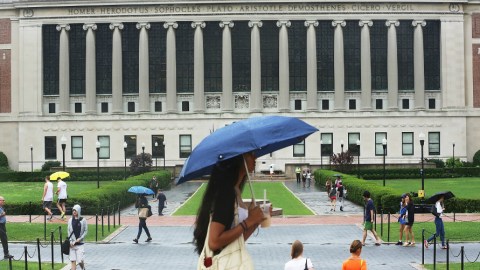Should You Default on Your Student Loans? Of Course Not.

In the first sentence of this piece, I would like to come out publicly as someone who has altogether way too much student loan debt. It’s a ludicrous amount. Outrageous. A subprime mortgage lender would look at my statement and say, “Boy, someone really screwed you over.” My monthly payments hamstring me. I work two full-time jobs in an effort to pay the loans down. I don’t seek sympathy, nor do I care to put up with criticisms built upon just-world fallacies. All I’d like to note is that acts of financial ignorance when I was 18 have followed me nearly a decade, and will continue to do so for the foreseeable future.
That said, as someone who swims through debt like Scrooge McDuck swims through doubloons, my ears open any time a new idea about student loans enters the public forum. The current piece roaring through social media this week comes from Lee Siegel in The New York Times:
“I defaulted on my student loans.
As difficult as it has been, I’ve never looked back. The millions of young people today, who collectively owe over $1 trillion in loans, may want to consider my example.”
Siegel writes that his credit currently resembles Bikini Atoll circa 1946, but he was able to prepare himself for this current state and stresses that those who consider following his lead need not be afraid. He even roots the piece on a series of moralistic arguments rooted in ideas of justice
“Moneyed stumbles never seem to have much consequence. Tax fraud, insider trading, almost criminal nepotism — these won’t knock you off the straight and narrow. But if you’re poor and miss a child-support payment, or if you’re middle class and default on your student loans, then God help you.”
It’s an interesting piece that I’ve seen passed around by young people seeking any means necessary to escape from debt.
It’s also terrible advice.
JJ Feinauer of Deseret Newshas done a good job summarizing the overwhelmingly negative response, with scathing critiques coming from a wide range of ideologies. For example, Slate’s Jordan Weissman calls Siegel’s article “deeply irresponsible” in his piece that, if you check the URL, was composed upon the idea that Siegel’s op-ed is the worst ever written about student loans. Other criticisms lay assault on Siegel’s sense of entitlement, his questionable ethical position, and his downplaying of the colossal consequences of default. It’s this last part that’s most vital.
We as a collective society are fully capable of wearing ourselves out yelling back and forth about the ethics of student loan debt, even before we tackle the questionable ethics of Siegel’s decision. I’m not interested. We’ve had this conversation plenty of times before. It’s like politics around the Thanksgiving table. (Shut up and pass the cranberry sauce.) Been there, done that — let’s save our breath and search for solutions rather than throw dirt.
What’s most important to point out about Siegel is this very basic truth: He’s not giving good advice, and those who follow him will likely be making a huge mistake. Siegel’s main error is in how dangerously myopic his assertions are. It may be easy for him, an author and critic of considerable fame and regard, to fearlessly get around his default. For pretty much anyone else, the garnishments and inability to pass a background check aren’t compatible with the feelings of comfort he promises:
“You might want to follow these steps: Get as many credit cards as you can before your credit is ruined. Find a stable housing situation. Pay your rent on time so that you have a good record in that area when you do have to move. Live with or marry someone with good credit (preferably someone who shares your desperate nihilism).”
That’s like saying, “Hey, don’t worry about the wildfire quickly approaching your home. Just dig a hole so you can live all subterranean-like from now on. You’ll like it. Nice and cool. No fire underground, after all.”
Hardly any oxygen either.
If there’s any good that could come from Siegel’s piece, it’s that his words will spur conversation about other more viable methods for dealing with crippling student debt. Mine is a burden, but I’m either too proud or stupid to even consider leaving my debt on someone else’s doorstep, though if the federal government decides it’s in the best interest of the country to bail us out, I’ll accept it. Until then, it’s a matter of making it work, day by day.
Read more at The New York Timesand Deseret News.
Below, Big Think Chief Economist Daniel Altman makes an off-the-wall suggestion for how a system in which students can avoid taking out student loans:
Photo by Mario Tama/Getty Images





